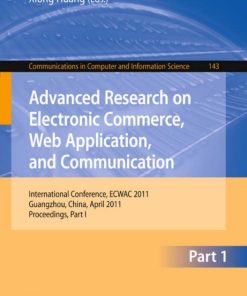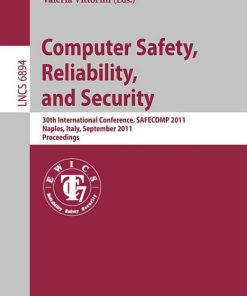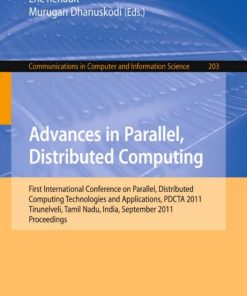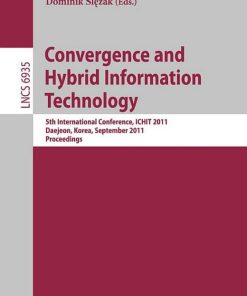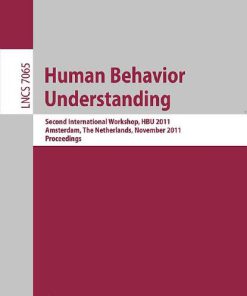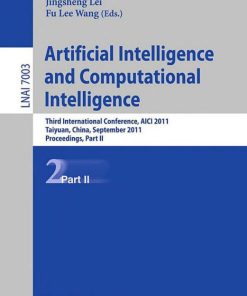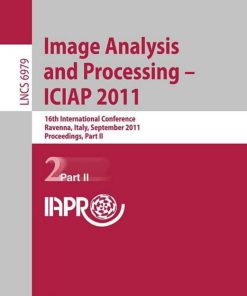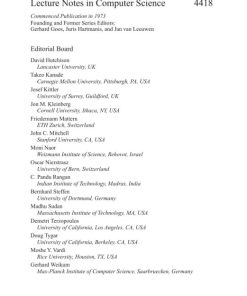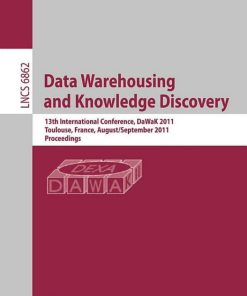Electronic Participation Third IFIP WG 8 5 International Conference ePart 2011 Delft The Netherlands August 29 September 1 2011 Proceedings 1st Edition by Efthimios Tambouris, Ann Macintosh, Hans de Bruijn ISBN 3642233333 9783642233333
$50.00 Original price was: $50.00.$25.00Current price is: $25.00.
Authors:Efthimios Tambouris, Ann Macintosh, Hans de Bruijn , Tags:Springer 2011 , Author sort:Efthimios Tambouris, Ann Macintosh, Hans de Bruijn , Ids:3642233325 , Languages:Languages:eng
Electronic Participation Third IFIP WG 8 5 International Conference ePart 2011 Delft The Netherlands August 29 September 1 2011 Proceedings 1st Edition by Efthimios Tambouris, Ann Macintosh, Hans de Bruijn – Ebook PDF Instant Download/Delivery. 3642233333, 9783642233333
Full download Electronic Participation Third IFIP WG 8 5 International Conference ePart 2011 Delft The Netherlands August 29 September 1 2011 Proceedings 1st Edition after payment

Product details:
ISBN 10: 3642233333
ISBN 13: 9783642233333
Author: Efthimios Tambouris, Ann Macintosh, Hans de Bruijn
This book constitutes the refereed proceedings of the Third International Conference on Electronic Participation, ePart 2011, held in Delft, The Netherlands, in August/September 2011. The 26 revised full papers were carefully reviewed and selected from numerous submissions. The papers are organized in topical sections on appreciation of social media; visualizing arguments; understanding eParticipation; eParticipation initiatiaves and country studies; participation and eServices; and innovative technologies.
Electronic Participation Third IFIP WG 8 5 International Conference ePart 2011 Delft The Netherlands August 29 September 1 2011 Proceedings 1st Table of contents:
Understanding Twitter™ Use among Parliament Representatives: A Genre Analysis
Introduction
Theoretical Premises
Genres of Communication
Models of eDemocracy
Research Method
Results
Discussion
Conclusion
References
Left and Right in the Blogosphere: Ideological Differences in Online Campaigning
Introduction
The Internet and Political Campaigning
The Swedish Political Context
Methods and Measurements
Individualism – Collectivism
Party Bond
Blog-Related Variables
Social Characteristics
Empirical Analysis
Who Are Swedish Political Bloggers?
Political Blogging, Collectivism and Individualism
Conclusions
References
Social Media and Political Participation: Are Facebook, Twitter and YouTube Democratizing Our Politi
Introduction
Literature Review
Social Media and Participation Defined
Field Study Dutch Elections
Future Research Agenda
References
Combining Social and Government Open Data for Participatory Decision-Making
Introduction
Related Work
Social Data to Understand and Predict Real Word Phenomena
Open Government Data
The Two-Phased Approach
Data Collection and Filtering
Data Analysis
The Web Data Oriented Architecture
Conclusions and Future Work
References
Extracting Semantic Knowledge from Twitter
Introduction
Related Ideas and e-Participation Use Cases
Semantic Patterns (SemPs)
Accessing Twitter
The Revolution in Egypt
Getting an Overview
Semantic Relations of Terms, Timestamps and Hashtags
Going into Details
Outlook – Twitter and e-Participation
References
Visualising Arguments
Argument Visualization for eParticipation: Towards a Research Agenda and Prototype Tool
Introduction
Drivers of the AVT
eParticipation Drivers
Argument Visualization Drivers
Designing the AVT
Document-Centricity: Anchoring Online Deliberation in Public Documents
State of the Art
Reusing Cohere as the AVT Platform
Towards a Research Agenda for Argument Visualization in eParticipation
Conclusion
References
Evaluation of an Argument Visualisation Platform by Experts and Policy Makers
Introduction
Argument Visualisation Platform
Evaluation Methodology
Evaluation Results
Conclusions
References
ArgVis: Structuring Political Deliberations Using Innovative Visualisation Technologies
Introduction
Related Work
ArgVis
Users and Functionalities
ArgVis Architecture and Implementation Details
Conclusions
References
Understanding eParticipation
eParticipation Research: A Longitudinal Overview
Introduction
Method
Limitations
Classification of the Research Domain
Findings and Discussion
eParticipation Actors
eParticipation Activities
Contextual Factors
eParticipation Effects and Evaluation
Conclusions
References
Power and Participation in Digital Late Modernity: Towards a Network Logic
New Media, New Logics?
Towards a Network Logic
Network Logic and E-Participation
References
Inform-Consult-Empower: A Three-Tiered Approach to eParticipation
Introduction
Policy Modelling
Policy Actors and Networks
Knowledge Generation
Knowledge Utilisation
Citizen Participation and eParticipation
The Inform-Consult-Empower Approach
Implementing the Inform-Consult-Empower Approach: Puzzled by Policy
Case Study: Immigration Policy in Spain
Conclusions and Future Work
References
Design Thinking and Participation: Lessons Learned from Three Case Studies
Introduction
Tackling Wicked Problems
The Think Services Approach
Workshops
Case Studies
Services Industriels de Genève
Parti Démocrate Chrétien
Collège Spécialisé des Systèmes d’Information
Analysis Framework
Lessons Learned
Conclusion and Future Work
References
Reference Framework for E-participation Projects
Introduction
Related Work
Procedural Models and Guidelines for E-participation
Enterprise Architecture Frameworks
Research Approach for Developing the Reference Framework
Reference Framework for E-participation
Dimensions
Domain Meta Model for E-participation
Procedural Reference Model for E-participation
Library with Requirements, Reference Models and Building Blocks for E-participation
Conclusion
References
eParticipation Initiatives and Country Studies
Measure to Improve: A Study of eParticipation in Frontrunner Dutch Municipalities
Introduction
Measuring and Benchmarking eParticipation
Development of a Measurement Instrument for eParticipation
Citizen Engagement
ICT Deployment
Organization
Findings
Citizen Engagement
ICT Deployment
Organization
Discussion and Limitations
Conclusion
References
Direct Democracy Catalysed by Resident-to-Resident Online Deliberation
Introduction
Case Description
Approach
Interview Results and Content Analysis
Conclusion
References
Knowledge as Power on the Internet
Introduction
The Production of Knowledge
Methods
Findings and Discussion
Knowledge and Power in the Development Gateway
Knowledge and Power in the Croatia Country Gateway
Conclusions
References
Revisiting the Conceptualisation of e-Campaigning: Putting Campaign Back in e-Campaigning Research
Introduction
Conceptualisations of e-Campaigning Utilisation in the Literature
Towards a Conceptual Framework of e-Campaigning Utilisation
Information Dissemination
Voter Interaction/Engagement
Support Mobilisation
Targeting Campaigns
Resource Generation
Summary
Applying the Conceptual Framework: An Empirical Example
Conclusion
References
An Overview Assessment of ePetitioning Tools in the English Local Government
Introduction
Study Background
EParticipation in the Local Government Context
EPetitioning in the UK and Beyond
Research Methodology
Study Findings
Discussion
Concluding Remarks
References
Questão Pública: First Voting Advice Application in Latin America
Introduction
Why Using a VAA?
Questão Publica, the Brazilian VAA
The Senate
Project Design
Outcomes
Conclusions
References
iLeger: A Web Based Application for Participative Elections
Introduction
The iLeger Web Application
Questions from the Citizens
Proposals and Ideas from the Community
Citizen Surveys
The Candidates` Electoral Program
Live Debates
Case Study: The 2011 Portuguese Presidential Elections
Future Work
Conclusion
References
Participation and eServices
One for All, All for One – Performing Citizen Driven Development of Public E-Services
Introduction
Participation as a Design Issue
Participation as a Symbolic Political Construct
Conceptual Disentanglement as a Methodology
Results and Analysis
Conclusions: The Complex Chore of Estimation
References
Talking about Public Service Processes
Introduction
Interaction between Society and Government in Public Affairs
Talking about Public Services
Supporting Public Service Conversations
Conclusion
References
Innovation and Evolution of Services: Role of Initiatives
Introduction
Genesis and State of the Art
Key Definitions
Processes of Innovation and Evolution
Towards Supporting Innovation and Creation in Services
Content-Based Analysis and Development of Information Kernel
Management of Initiatives through Knowledge Actionalizing
Supporting Continuous Development of Services-Related Ontologies
Implementation: Cross-Pollination Space
CTI Project
Conclusions
References
Innovative Technologies
Citizen Engagement with Information Aggregation Markets
Introduction
E-Participation and Citizen Engagement
Information Aggregation Markets
Information Aggregation Markets for Citizen Engagement
Real Life Cases of Information Aggregation Markets for Citizen Engagement
Reforming the Bible History Class at the State of Bremen
European Commission Consultation on Information and Communication Technologies for Enabling Energy E
Conclusions
References
Towards a Structured Online Consultation Tool
Introduction
Context and Current Tools
Contribution of the SCT
The Representation of Argumentation
Arguments and Argumentation Frameworks
Argumentation Schemes
A Prototype Structured Online Survey Tool
Advancing a Structured Online Survey Tool
Additional Argumentation Schemes
Towards a Formalisation of Argumentation Schemes
Conclusion
References
A Review of Opinion Mining Methods for Analyzing Citizens’ Contributions in Public Policy Debate
Introduction
Opinion Mining Objectives and Concepts
Document and Sentence Level Sentiment Analysis
Document-Level Sentiment Analysis
Sentence-Level Sentiment Analysis
Polar Words
Feature-Based Sentiment Analysis
Feature Extraction
Identification of Opinion Orientation
Ontology-Based Sentiment Analysis
Sentiment Analysis in Project PADGETS
People also search for Electronic Participation Third IFIP WG 8 5 International Conference ePart 2011 Delft The Netherlands August 29 September 1 2011 Proceedings 1st:
electronic participation
full electronic participation in society
it encompasses the full electronic participation in the society
the state of full electronic participation in society is
it refers to full electronic participation in society




